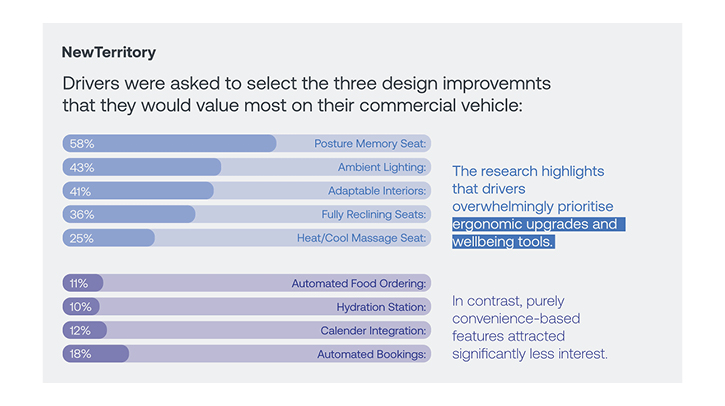NewTerritory, a design studio specializing in human-centred experiences for the automotive and aviation sectors, has published the results of its latest behavioral research study examining the underlying needs, preferences and decision-making factors of commercial vehicle (CV) drivers in relation to the future design of vans, trucks, lorries, buses, coaches and refrigerated vehicles.
The study found that commercial vehicle drivers are calling for smarter comfort and practical wellness features over coffee-ordering bots or in-vehicle butlers.
“Commercial vehicle drivers aren’t asking for flashy, car-like tech,” said Luke Miles, founder of NewTerritory. “They want a workspace that cares for their bodies, sharpens their focus and helps them recover between shifts. We need to start designing commercial vehicles to act as multi-modal hosts which adapt to the occupants’ changing needs over time, rather than simply means of transport.”

The research highlights that drivers overwhelmingly prioritize ergonomic upgrades and well-being tools.
Drivers were asked to select the three design improvements that they would value most on their commercial vehicle. The most requested feature was adjustable seating with posture memory, with 58% of drivers requesting this. Just under half (43%) of drivers said they value ambient lighting and mood settings, with adaptable interiors (for shifting work modes) chosen by 41%.
The research found that purely convenience-based features attracted significantly less interest, with 11% of drivers valuing automated coffee/food ordering, 10% valuing a hydration station with reminders, and 12% valuing calendar integration/appointment alerts. Automated trip planning and bookings were valued by 18% drivers.
NewTerritory says that, based on its study, CV drivers are looking for vehicles that act like a wellness sanctuary and support their workflow, prioritizing comfort and fatigue reduction over consumer‑style techy features. The studio adds that without a well-designed and supportive cabin environment, drivers can suffer from fatigue, stress, musculoskeletal discomfort and decreased concentration.
“When you stop thinking of a van as a machine and start thinking of it as a host, everything changes and we think van manufacturers that ignore this design mindset shift, will be left behind,” said Miles.
“Putting the driver first is crucial, they deserve and want environments that are not just functional, but restorative. This is about supporting their bodies, boosting concentration and reducing strain.”
Using its brand intelligence platform, the studio spent over 450 hours over 12 months investigating consumer preferences across major transportation sectors. The findings are based on 1,025 commercial vehicle drivers.
In related news, Ferrari has unveiled the Ferrari Amalfi, a front-mid-engine V8 2+ coupé that replaces the Ferrari Roma in the Prancing Horse line-up



